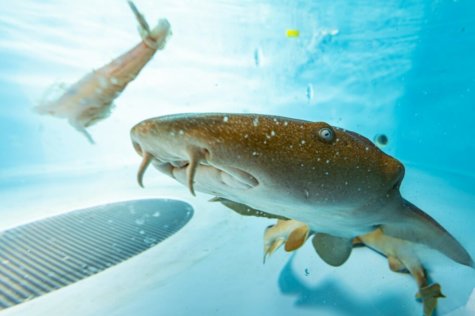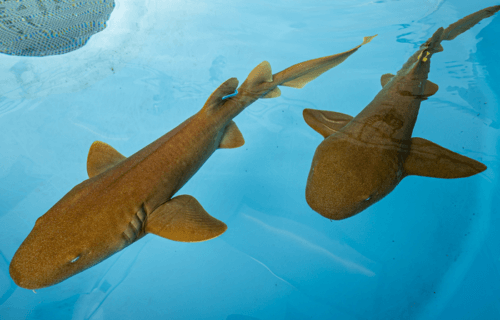MADISON, Wis. — Maybe “Jaws” was just misunderstood after all. Although many people have a natural fear of sharks, these furious fish may help scientists fight COVID-19 and future variants. Scientists at the University of Wisconsin-Madison have discovered that small, “antibody-like” proteins derived from the immune systems of sharks are capable of blocking SARS-CoV-2 from infecting human cells.
This incredible finding remained consistent across various COVID-19 variants, as well as additional coronaviruses which cause sicknesses like the common cold.
These proteins, which the team call VNARS, are not available as a COVID-19 treatment yet. Still, researchers say even if VNARS aren’t ready to deploy during this pandemic, these discoveries will undoubtedly help humanity better prepare for future global health threats. For instance, the research shows that VNARS can neutralize WIV1-CoV, which is another coronavirus that only circulates in bats right now. However, if that coronavirus ever jumped to humans, VNARS may become an invaluable asset.
“The big issue is there are a number of coronaviruses that are poised for emergence in humans,” says co-study leader and professor of pathology Aaron LeBeau in a university release. “What we’re doing is preparing an arsenal of shark VNAR therapeutics that could be used down the road for future SARS outbreaks. It’s a kind of insurance against the future.”
Size matters when fighting COVID

Isolated and studied within a large synthetic lab, VNARS are just one-tenth the size of human antibodies. However, this makes these helpful proteins capable of binding to infectious proteins in a unique way that helps stop infection.
“These small antibody-like proteins can get into nooks and crannies that human antibodies cannot access,” Prof. LeBeau explains. “They can form these very unique geometries. This allows them to recognize structures in proteins that our human antibodies cannot.”
Researchers tested the VNARS against both genuine SARS-CoV-2 samples and a manipulated version of the coronavirus (or pseudotype) incapable of replicating in cells. Among a pool of billions of different VNARS, the team identified three that appear to be the most adept at stopping the coronavirus. The three VNARS were also quite capable of stopping SARS-CoV-1, the virus strain responsible for the SARS outbreak in 2003.
One VNAR specifically, called 3B4, can attach itself very strongly to a groove on the viral spike protein near where the virus binds to human cells. This halts the infection process altogether. Importantly, that viral groove is largely the same among various coronaviruses, meaning 3B4 is likely capable of stopping many different virus strains. Researchers successfully used 3B4 to impede the MERS virus, for example.
Study authors add 3B4 may be the strongest VNAR candidate to use against future coronaviruses and pandemics. It should also be effective against the Delta variant and, although this work took place before the emergence of the Omicron variant, scientists are confident that VNARs can stop this new strain as well.
A shark ‘cocktail’ may be cheaper than current COVID medications
Scientists are also looking at another VNAR, called 2C02. This variation can lock the spike protein into an inactive form, but likely isn’t as universally effective against COVID variants as 3B4.
The team notes that they still need to complete plenty of work before patients start receiving a prescription of shark antibodies from their doctors. However, study authors say future treatments will likely feature a “cocktail” of various VNARS in order to maximize effectiveness against mutating viruses. Another notable benefit is that shark antibodies will be much cheaper to produce and purchase than human antibodies.
The findings appear in the journal Nature Communications.
